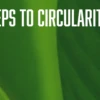France has one of the most influential fashion cultures in the world, making it an attractive market for fast-growing fashion brands targeting European expansion. The country is also a pioneer in sustainability and circular economy initiatives. This means that brands looking to enter the French market often need to adopt different sustainability practices
Read on to learn how recent sustainability regulations are impacting the French fashion market and our top tips for maximising your brand’s chances of success.
Get ready for stricter sustainability regulations
France is leading the in implementing sustainability policies, setting an influential precedent for the rest of Europe. For example, France banned the destruction of unsold clothing in January 2021 – well ahead of similar EU-wide measures. In fact, this was three years before a similar EU measure was approved by the European Parliament in April 2024.
The country’s proactive approach stems from France’s Circular Economy Roadmap, introduced in 2018. The roadmap criticised the traditional ‘linear’ model of ‘producing, consuming, discarding’, warning of its inevitable strain on the planet’s resources. In response, it set out a vision for a more circular fashion ecosystem – one that prioritises waste reduction, recycling and reuse.
This pioneering vision is now shaping key legislation and unlocking funds for significant investment in circular initiatives. For instance, through the Extended Producer Responsibility (EPR) Roadmap (2023-2028), France has already invested €1 billion in five major garment recycling projects .In fact, the country is already a frontrunner in EPR, with Producer Responsibility Organisation (PRO) - ReFashion helping brands to take responsibility for the end-of-life stage of their products.
Another vital part of France’s circularity legislation is the Anti-Waste and Circular Economy Law (AGEC). This law introduces mandatory waste reduction targets for industries, restricts single-use plastics and requires products to be designed with recyclability and reusability in mind.
Want to find out about France’s Triman labelling regulations for clothing? Read more about Triman labelling.
Due to these legislative developments, entering the French market may seem daunting for fashion brands. But for those willing to embrace circularity, France offers an exciting, forward-thinking market that rewards sustainability.
Get to know the French circular fashion ecosystem
Collaboration is the key to the success of France’s sustainable fashion industry. To accelerate progress, industry clusters like Techtera encourage companies to share resources and expertise, accelerating progress towards common sustainability goals.
Another standout organisation is The Fashion Pact, which aims to drive collective action towards more sustainable practices across the industry. It’s led by a steering committee of 15 elected CEOs, who are advised by an operations committee of 24 chief sustainability officers. The steering committee includes the CEOs of major international brands such as GAP, Ralph Lauren and H&M Group. These committees determine the high-level strategic direction of the organisation and guide working groups to achieve intra-industry progress on circularity.
The best advice for any brand entering the French market is simple: get connected with the right organisations and you’ll benefit from a thriving sustainability eco-system.
Move away from fast fashion
As well as promoting circular economy initiatives, France is also aiming to reduce the environmental impact of fast fashion through new legislation. A landmark bill has already passed the lower house of parliament (Assemblée générale) proposing strict measures to combat unsustainable practices by fast fashion brands.
Key proposals from the bill include a surcharge on fast fashion items, starting at €5 per item and increasing to €10 by 2030. The bill also aims to ban fast fashion advertising and introduce public information campaigns to raise awareness about the industry’s environmental footprint.
While these efforts are in line with broader European sustainability goals, they put France ahead of the curve in tackling overconsumption. So, if your brand is looking to expand into the French market, moving away from fast fashion practices will position you for success.
Why a French connection makes sense for your apparel brand
As we’ve seen, in the French market, consumers and policymakers alike are rewarding companies that invest in responsible production, repair and recycling – helping to mitigate the negative effects of ‘take-make-dispose’ business models. Incorporating circularity into your operations can therefore help you thrive in France and future-proof your business by tapping into a market that values innovation, transparency and sustainability.
Want to find out more about implementing circular solutions for your fashion or lifestyle brand? Contact us today for a free consultation with a Bleckmann logistics expert!

















